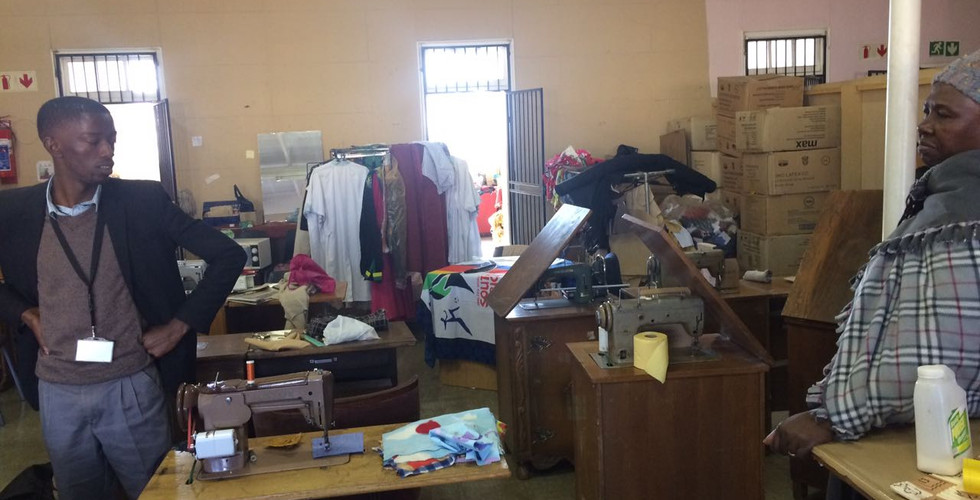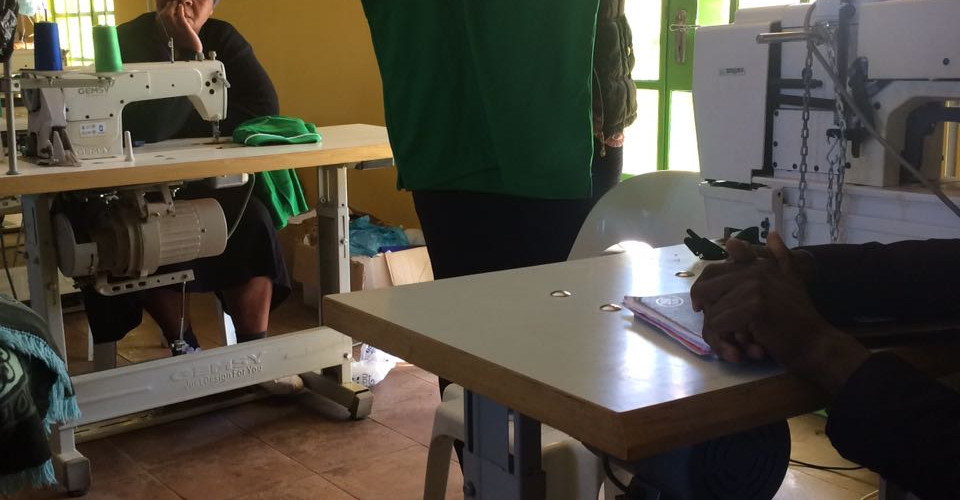IEOM UJ Student Chapter Visit Cooperatives in Soweto, South Africa
- Jul 4, 2017
- 6 min read
A Primary cooperative is a democratic owned enterprise. The cooperatives visited on June 29, 2017 are a sewing cooperative scattered in the Soweto region. After a very formative workshop with the cooperative members at the University of Johannesburg's Soweto campus, the IEOM Members saw a need to do a follow up in a form of site visit. Out of five cooperative that were initially scheduled to visit, the IEOM group managed to visit four cooperatives within the Soweto region.
BUSISIWE PRIMARY COOPERATIVE
Busisiwe Primary cooperative was established 11 years ago with about 46 members who were organized under an organization called Batho Pele, Busisiwe cooperative in one of those co-ops that are running under city of Johannesburg properties, the cooperative are mainly supported by the tender from department of social development. The cooperative has been in existence since 2006, started with 46 members and currently left with 5 members who are very passionate about sewing. The members have never had any funding in a form of finance but have 14 machines which were donated by South African Department of Trade and Industry (DTI) and Social Development. The cooperative members get paid seasonally depending on the number of tenders they get from social development to make school uniform of public schools, beside that the cooperative does not have other organization that they can make clothes for. The cooperative members mentioned that it is very difficult as they do not have any monthly salaries, and what keeps them going is the passion for sewing.
During the visit, it was observed that the co-op members are working under a very dangerous situation as the building’s roof at their manufacturing facility is collapsing, as seen on the picture below. The roof is a very dire condition. The taps are also seriously leaking causing great loss of water.

Out of 14 industrial machines that the co-ops owns only four are in working condition. Due to lack of funds, there is an obvious challenge to attend to the maintenance of the equipment, and eventually repair the broken machines.
With UJ Enactus initiative of computer literacy and Business studies, the cooperative is faced with financial constraints. There is a possibility that their members might not be able to attend training. The expectation is free training for knowledge acquisition.
Cooperative’s members now seem to be aware of the cooperative knowledge. Due to the cooperative not performing very well the members are not able to perform all the function of a cooperative like adding at least one member annually, creating employment and etc. One can tell that also some of the cooperative policy are also not followed such as a substitute cash that had to be save in a cooperative bank. As they are unable to perform maintenance on the sewing machines, their production capacity is negatively affected. Provided that the cooperative was able to pay regular salaries to their members, such members should also be in a position where he/she would be able to get some shares in the organization. In an event that funds would be available, it would be used to run the expenses of the business.
Due to lack of cooperative tribunal in South Africa, although there talks by the Department of Trade and Industry back in 2012 to establish such, the cooperative enterprises are faced with both internal and external conflicts that are not fairly resolved. The cooperative used to have a laptop, one of the cooperative members left the cooperative with the asset and unfortunately nothing much could be done about the issue.
BUMBISIZWE PRIMARY COOPERATIVE
The primary cooperative was registered 2010 by Mrs Kgame, who had a registered close corporation. She saw a need to form a cooperative as in South Africa by then there were more opportunities for cooperative other than close corporation. Mrs Kgame, when she was still running a close corporation, had an opportunity to show case her work at the world summit that took place 2002 in Johannesburg, South Africa. Her organization was also having a client in Namibia to whom she was supplying with wedding garments. As a cooperative from 2010 she had to channel her business into where the co-op opportunities were. She then got a tender from the Department of Social Development to supply school uniforms to public schools. Such tender keeps the cooperative busy and the members are happy with their seasonal pay off. Mrs Kgame indicated challenges faced due to competition by major retail stores, for example PEP Store selling short sleeves school shirt for R60.00, while their cooperative sells it for R150.00. This difference in prices makes it difficult for them to have customers from the same schools where they are manufacturing uniforms through Department of Social Development. The cooperative also operates in one of City of Johannesburg properties, which was given to Mrs Kgame due to her achievements, as well as skills.
During the visit at the Bumbisizwe Primary Cooperative, it was observed that the arrangements and layout of the factory is not appropriate per regulation as one will find it difficult to identify exit points. As per the picture below, the storage area is merged with the production area. Paper boxes, materials as well as equipment are laying everywhere.

During the visit of the production facility, It was evident that safety components were not visible which cause serious concerns should there be an incident such as fire. The issues indicated earlier could be due to the fact that the members of the cooperative are quite aged with the average age being fifty years old and that could affect their ability to adhere to strict factory regulations.
The cooperatives has close to 50 industrial sewing machines and other supporting machines like over-locks etc. Mrs Kgame is able to perform minor repairs on the machines when broken, and she mentioned that there is a trained repairman who performs regular maintenance on the equipment when major repairs are required, therefore only 10% of machines are not operational but she mentioned that she just need sometimes to thoroughly assess the machines.

The members of cooperative seem to be very happy with how the cooperative is currently operating. Due to a high number of cooperatives enterprises that fail in South Africa for various reasons, with the main one being lack of access to funding, it is evident that Bumbisizwe cooperative is doing its level best in terms of ensuring the survival of their organization. The cooperative has expressed the need to continuously learn and train in order to acquire a better understanding of how to form and run a secondary cooperative. Their willingness to embark on this initiative was noted during the visit and taken into consideration by the members of the IEOM UJ Student Chapter as well as Enactus members. Future expectations from the cooperative indicates the needs to acquire a fusing machine for the school uniforms that they are producing. The challenge here is that the members need to be able to save money through subsidy that the cooperative save in their cooperative bank account.
LWEZI PRIMARY COOPERATIVE
The Lwezi cooperative is currently four years old and is operating at the old Vista University at Soweto. The cooperative is quite small with five members, who are all women. The members of the cooperative are more than willing to train the youth and they say they have skills that they would like to transfer. The cooperative is also depending on social development tenders by making school uniforms for public schools. The members are all pensioners and are happy with the current financial status, as they say that while they are waiting for social development tender they keep themselves busy with their own clients. They would like to turn their cooperative into a training center where they are transferring their skills the young people.

As shown in the above picture, the space utilized by the Lwezi Primary Cooperative is very small, and is not observing adequate housekeeping to keep the work environment clean. In this particular facility, it was observed that there was no emergency exit point or any health and safety components in the case of emergency such as fire incident.
Each member is responsible for the machine that she is using, so it becomes the responsibility of the member to maintain and fix the machine. Since the user knows the machine best, it is easier to allocate the minor maintenance tasks and keep the machine in good working condition.
BADUMEDI PRIMARY COOPERATIVE
The cooperative was registered in 2008 with seven members. The cooperative is currently having five members after two left. It used to do tenders for social development and the last time they got the tender was 2011. Currently the cooperative has only one preschool which they are providing with gold t-shirts for the pupils. The cooperative members are currently not happy with the status of the co-op as they no longer have a space to operate, hence the are no pictures for the because we meet in the house of one of the members.
CONCLUSION
During the visits, it was found that the four cooperatives are facing various challenges, with the main one being difficulty to access funds necessary to run their operations, and challenging market penetration with not enough business available. Albeit the various issues the cooperatives are facing, it has been evident that the cooperatives would like to improve on their ability to acquire more business and improve their operations.


























Comments